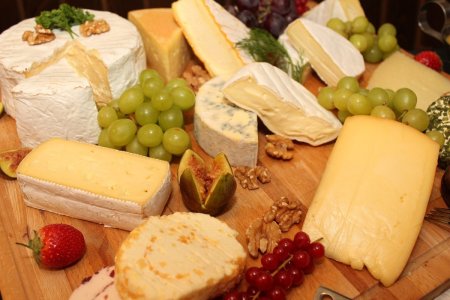Unlock the secret to a better night’s sleep with just one surprising food!
- Replies 0
Disclaimer: The information provided in this article is for educational purposes only and is not intended as a substitute for professional medical advice, diagnosis, or treatment. Always consult your physician or other qualified healthcare providers with any questions you may have regarding a medical condition or before making any changes to your health regimen.
Are you tossing and turning at night, counting sheep in vain?
Before you reach for sleep aids or a new mattress, consider this: the secret to a restful night might just lie in your refrigerator.
For those who relish a good dairy dish, there's even more reason to celebrate.
A study that's sure to please fromage aficionados everywhere has revealed a tantalizing link between cheese consumption and reduced risk of sleep apnea, a sleep disorder characterized by pauses in breathing or periods of shallow breathing during sleep.
The research, published in the prestigious journal Sleep Medicine, analyzed data from a whopping 400,000 participants from the UK Biobank and the FinnGen Biobank.
“These findings underscore the potential of dietary interventions in public health strategies aimed at decreasing sleep apnea prevalence and associated health risks,” the researchers concluded.
The findings? Those who enjoyed cheese had a 28% lower risk of suffering from sleep apnea compared to those who steered clear of dairy delights.
But the good news doesn't stop there. Cheese consumption was also associated with better levels of 23 biomarkers related to sleep apnea, painting a picture of cheese as a potential ally in the quest for uninterrupted slumber.

Cheese is more than just a tasty treat; it's a powerhouse of nutrients. Packed with protein, calcium, essential fatty acids, amino acids, vitamins, and bioactive peptides, cheese is a nutrient-dense food that can contribute to overall health.
The researchers behind the study believe that these qualities may positively impact metabolic and cardiovascular health, which in turn could help fend off sleep apnea.
This study is pioneering in its focus on the specific relationship between cheese and sleep apnea. While further research is needed to fully understand the mechanisms at play, the initial findings are promising.
The study suggests that cheese intake may influence sleep apnea risk through specific metabolic pathways, offering a glimpse into how dietary choices can play a role in managing and preventing sleep disorders.
Despite its reputation for being high in saturated fat and sodium, cheese can fit into a healthy diet when chosen wisely.
Opting for harder, minimally processed cheeses like cheddar, Swiss, parmesan, and blue can offer more calcium and health benefits than their softer counterparts like brie.
Aged cheeses, in particular, have been recognized for aiding digestion and boosting immunity.
Moreover, cheese's health benefits extend beyond sleep. A 2020 study involving over 145,000 people across 21 countries found that consuming two daily servings of dairy could reduce the risk of diabetes or hypertension by 11% to 24%.
And let's not forget the mental health angle: robust mental health and stress resilience have been linked to regular cheese consumption.
If you're looking to harness the sleep-promoting powers of cheese, here are some tips:
1. Choose wisely: Go for cheeses that are lower in sodium and saturated fats. Harder, aged cheeses are typically healthier options.
2. Portion control: Enjoy cheese in moderation. A small serving can go a long way in providing the benefits without the drawbacks.
3. Timing matters: Have a small serving of cheese as a part of your evening snack. This could help set the stage for a better night's sleep.
4. Variety is key: Experiment with different types of cheese to reap a range of health benefits.

Have you noticed a difference in your sleep after enjoying cheese? Do you have a favorite bedtime snack that seems to help you drift off? Share your experiences and tips in the comments below!
Are you tossing and turning at night, counting sheep in vain?
Before you reach for sleep aids or a new mattress, consider this: the secret to a restful night might just lie in your refrigerator.
For those who relish a good dairy dish, there's even more reason to celebrate.
A study that's sure to please fromage aficionados everywhere has revealed a tantalizing link between cheese consumption and reduced risk of sleep apnea, a sleep disorder characterized by pauses in breathing or periods of shallow breathing during sleep.
The research, published in the prestigious journal Sleep Medicine, analyzed data from a whopping 400,000 participants from the UK Biobank and the FinnGen Biobank.
“These findings underscore the potential of dietary interventions in public health strategies aimed at decreasing sleep apnea prevalence and associated health risks,” the researchers concluded.
The findings? Those who enjoyed cheese had a 28% lower risk of suffering from sleep apnea compared to those who steered clear of dairy delights.
But the good news doesn't stop there. Cheese consumption was also associated with better levels of 23 biomarkers related to sleep apnea, painting a picture of cheese as a potential ally in the quest for uninterrupted slumber.

A recent study suggests cheese consumption may reduce the risk of sleep apnea, with cheese eaters having a 28% lower risk than those who do not consume cheese. Image source: Micah / Pixabay.
Cheese is more than just a tasty treat; it's a powerhouse of nutrients. Packed with protein, calcium, essential fatty acids, amino acids, vitamins, and bioactive peptides, cheese is a nutrient-dense food that can contribute to overall health.
The researchers behind the study believe that these qualities may positively impact metabolic and cardiovascular health, which in turn could help fend off sleep apnea.
This study is pioneering in its focus on the specific relationship between cheese and sleep apnea. While further research is needed to fully understand the mechanisms at play, the initial findings are promising.
The study suggests that cheese intake may influence sleep apnea risk through specific metabolic pathways, offering a glimpse into how dietary choices can play a role in managing and preventing sleep disorders.
Despite its reputation for being high in saturated fat and sodium, cheese can fit into a healthy diet when chosen wisely.
Opting for harder, minimally processed cheeses like cheddar, Swiss, parmesan, and blue can offer more calcium and health benefits than their softer counterparts like brie.
Aged cheeses, in particular, have been recognized for aiding digestion and boosting immunity.
Moreover, cheese's health benefits extend beyond sleep. A 2020 study involving over 145,000 people across 21 countries found that consuming two daily servings of dairy could reduce the risk of diabetes or hypertension by 11% to 24%.
And let's not forget the mental health angle: robust mental health and stress resilience have been linked to regular cheese consumption.
If you're looking to harness the sleep-promoting powers of cheese, here are some tips:
1. Choose wisely: Go for cheeses that are lower in sodium and saturated fats. Harder, aged cheeses are typically healthier options.
2. Portion control: Enjoy cheese in moderation. A small serving can go a long way in providing the benefits without the drawbacks.
3. Timing matters: Have a small serving of cheese as a part of your evening snack. This could help set the stage for a better night's sleep.
4. Variety is key: Experiment with different types of cheese to reap a range of health benefits.
Key Takeaways
- A recent study suggests cheese consumption may reduce the risk of sleep apnea, with cheese eaters having a 28% lower risk than those who do not consume cheese.
- Research indicates that cheese intake is associated with biomarkers linked to sleep apnea, potentially influencing the disorder through specific metabolic pathways.
- Cheese is a source of nutrients like protein, calcium, and essential fatty acids, which may contribute to metabolic and cardiovascular health, thereby impacting sleep apnea risk.
- While cheese often has a reputation for being high in saturated fat and sodium, selecting lower sodium, minimally processed varieties, particularly harder cheeses, can be part of a healthy diet and offer additional health benefits.
Have you noticed a difference in your sleep after enjoying cheese? Do you have a favorite bedtime snack that seems to help you drift off? Share your experiences and tips in the comments below!






